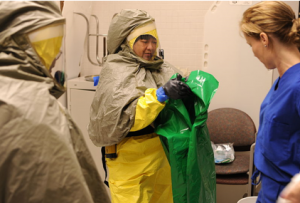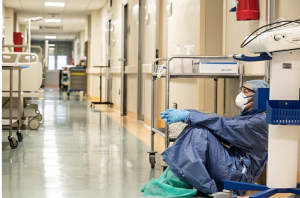6
Blake Busking
Someone could strengthen the theory section…think about adding more about the definition of modernization theory and the connection with your topic to STS in general…internal citations need to have the name of the author and the date. For statements like this: “For places with a large capacity like, university, concerts, sporting events, and restaurants, it is believed that it will be many years before they are back to what they were.”, you need to have more source information. Who believes this? Another example is this: “For example, in rather recent times, the events taken place on September 11th, 2001 changed the way Americans viewed the security of America from foreign countries and found flaws in the airport security system. ” Again, you need some facts to back this statement up. Your images need to have alt text, your citations need to be in APA format and in hanging indent.
Introduction
The COVID-19 virus has undoubtedly changed the way people have lived their lives within a relatively short period of time. It has greatly affected the economy and big businesses, forcing them to adapt to the times and new regulations put in place to keep people safe. There has not been another pandemic of this magnitude for around 100 years, but as is the case with every pandemic and similar events, new regulations and preventative strategies have been developed to make sure horrible events such as these are less likely to happen again. In the future, the medical technology developed as a result of COVID-19 will impact the future of disease outbreaks, and the different ways in which doctors and nurses will approach pandemics to come. Based on past reactions to societal crisis, COVID-19 will change the way people react during impactful social situations, and will forever change basic hygiene rules like mandatory hand washing, temperature checks, and sanitation of public areas.
Connection to STS Theory
The changes that businesses have put in effect since the emergence of COVID-19 relates to the STS theory of Modernization, which describes the scientific, technological, and social constructs that develop and improve over time. With the hysteria of events over the past year, people have begun to wonder what will happen in the future in terms of hygiene and rules. Reflecting on the past, it is clear that other global pandemics have permanently altered the structure of societal regulations and personal hygiene. Nowadays, especially with extensive research done due to the Coronavirus, science has taught us so much more than we previously knew about diseases and how they spread. It is inevitable that history will repeat itself, and the society in the near future will adjust to the necessary sanitation regulations that COVID-19 has imposed in today’s world.
Relating to Past Global and National Crises
In the past, there have been major events from 10 years ago or even centuries ago that permanently changed how people lived in their societies. For example, in rather recent times, the events taken place on September 11th, 2001 changed the way Americans viewed the security of America from foreign countries and found flaws in the airport security system. The preventative strategies that took place after this event led to an extreme increase in airport security and changed the way the United States handled foreign relations. Even after the disaster, the United States became closer and worked together to make sure to grow stronger and prevent events in the future (Dartnell).

Relating more to past pandemics, the Black Death in Europe, and around the world, was a detrimental devastation socially, physically, and economically. After the millions of fatalities in Europe and over a third of the population lost, Europeans realized that there was a problem with their hygiene and medical procedures. Europeans now knew of proper sanitation, and realized how bacteria and disease can be prevented through cleaning your surroundings and adequate bathing (Blakemore). Once the plague commenced, the medical technology and overall awareness of public health was thoroughly improved. Throughout the pandemic, the immediate changes included being covered head to toe with a protective material and a beaked mask, which is now how most people see the black death when they look back in history (Blakemore). Although the doctor’s outfits did not make much of a difference, it led to an awareness for hygiene and made Europeans worry more about their personal health.
Voices from Clemson Undergraduate Students
As a first semester student at Clemson University, COVID-19 has affected the ways I learn, live, interact, and socialize. Although it is not particularly convenient, I understand that being a student with these precautions makes the campus a healthier and safer place. Online learning can be difficult but has shown how important it is for students to learn to react to events that happen around them. With all of the negative effects given to us from COVID-19, it is good to take a look on the positive side of things by thinking of how the whole world adapted and became stronger after the introduction to the virus. The changes in the world now compared to the times before COVID-19 has made me realize that precautions will change even after there are little to no cases in the world, similar to other horrific events that changed the world.
What Preventative Strategies Will Change in the Future?
When adapting to the COVID virus, doctors and the government made it the highest priority to make sure they do everything they can to prevent the virus from spreading more that it already has. In any public place in the country, it is always strongly recommended to keep a mask on and to maintain socially distant from other individuals or groups. In specific states in the US, there is a legal fine for anyone who is out in public and not wearing a mask.
Of course, as helpful as these rules were, there were still thousands of people who would break them, and many would still contract the virus (UChicago). A more specific public place that needed many rules to run smoothly were schools. In the beginning of the pandemic, virtually all schools were online. For many, especially those who are technologically challenged, there are many difficulties that came with online schooling. Classes were harder to teach, lessons were harder to learn, and motivation was harder to grasp for all. Even through the tough times, Americans stood together to fight through the isolation from loved ones and the difficulties of day to day lifestyle changes.

Although it is not known when everything will go back to “normal”, rules and mandates are being slowly lifted, but nowhere close yet to a what life was like pre-COVID (Dartnell). For places with a large capacity like universities, concerts, sporting events, and restaurants, it is believed that it will be many years before they are completely back to normal.
Conclusion
Without a doubt, COVID has changed the world in a way that no one would have ever expected. These changes include positive ones, such as technological advancements to help those who are in need, as well as creative ways to make life still seem “normal”. However, there have also been negative changes, such as strict restrictions keeping communities of people separated, and making in-person activities like school, work, and events online with little social interaction. Changes from this pandemic will likely continue to exist after the pandemic with regulations and rules put into place with the purpose of preventing something like this from ever happening again.
References
Anne-Emanuelle Birn is Professor of Critical Development Studies (UTSC) and Social and Behavioural Health Sciences (Dalla Lana School of Public Health) at the University of Toronto, & *, N. (2018, March 16). How did the plague impact health regulation? OUPblog. https://blog.oup.com/2018/03/plague-impact-health-regulation/.
Cassel, D. (2020, April 10). How Technology Helped Us Through the 1918 Flu Pandemic. The New Stack. https://thenewstack.io/how-technology-helped-us-through-the-1918-flu-pandemic/.
COVID 2025: How the pandemic is changing our world. University of Chicago News. https://news.uchicago.edu/story/covid-2025-how-pandemic-changing-our-world.
The Covid-19 changes that could last long-term. https://www.bbc.com/future/article/20200629-which-lockdown-changes-are-here-to-stay.
Magazine, P. O. L. I. T. I. C. O. (2020, April 15). Coronavirus Will Change the World Permanently. Here’s How. POLITICO. https://www.politico.com/news/magazine/2020/03/19/coronavirus-effect-economy-life-society-analysis-covid-135579.
Photograph by The Picture Art Collection, & Cosua, P. by G. (2020, March 31). Why plague doctors wore those strange beaked masks. National Geographic. https://www.nationalgeographic.com/history/reference/european-history/plague-doctors-beaked-masks-coronavirus/.
Images
Plague doctors’ beak shaped mask” by Gerhart Altzenbach is in the Public Domain, CC0
“Covid-19 San Salvatore 09” by Alberto Giuliani is licensed under CC BY-SA 4.0
“Hazmat suit” by Euthman is licensed under CC BY 3.0
